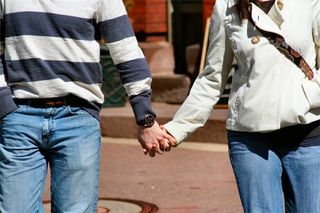Good Deeds Fuel Good Deeds

The warm and fuzzy feelings you may experience after watching others perform virtuous deeds may in turn lead you to act altruistically as well, according to a new study based on the results of two separate experiments.
Among the findings: People who watch inspirational clips from the Oprah Winfrey Show are more likely to commit to helping others, and spend more time doing a "good deed."
However, since the study was based on a small number of participants who were all female, more research is needed to back up the findings.
Inspiration from Oprah
Past research has shown when we watch others lend a helping hand, we feel inspired and uplifted. Few studies, however, have actually looked at whether or not we're really more likely to follow suit after witnessing the do-gooder behavior.
To find out Simone Schnall of the University of Cambridge in England and her colleagues had about 30 college students watch a video clip from Oprah meant to stir uplifting feelings. No, it wasn't the famous TV moment in which the talk-show host gave cars to her guests. Instead, it was a clip of musicians thanking their former mentors. Thirty other students watched a neutral video, not meant to stimulate any particular feeling, in this case, a nature documentary.
Believing the study was meant to test memory, the subjects wrote an essay recalling as much as they could about the video. They were then paid for their participation, and asked if they would like to take part in another, unpaid study.
Sign up for the Live Science daily newsletter now
Get the world’s most fascinating discoveries delivered straight to your inbox.
About 69 percent of those who watched the Oprah clip signed up for the unpaid study, compared with 40 percent of those who watched the nature documentary, the researchers report in the Jan. 29 issue of the journal Psychological Science.
But saying you're going to do something and actually doing it are two very different things.
Taking time to lend a hand
To find out how watching good deeds could actually spur actions, in the second experiment, 36 female participants individually watched one of three videos: the Oprah segment, the nature doc, or a clip from a British comedy show.
This time, the female instructor who was showing the videos pretended that she couldn't open an important computer file needed for the participant to complete the test. Without the file, each participant was told she was free to leave.
Before the subject was out the door, the instructor casually mentioned another, voluntary questionnaire for a different study. The experimenter admitted that the questionnaire was quite boring, but it would really help her out if the subject completed it.
If the participant said she would do it, she was told she could stop whenever she wanted, and was secretly timed during the test.
The results showed that those who watched the Oprah clip spent twice as long completing the questionnaire (and in turn, helping out the experimenter) compared with those who viewed the nature or comedy clip.
The subjects also reported how they felt just after viewing their clip. Those who reported certain emotions, such as feeling "moved and uplifted," or "having a warm feeling in the chest" were more likely to help the instructor than others, the researchers say.
The study included only female participants just in case men might be more likely to want to aid the female instructor.
The study was funded by the National Science Foundation and the Economic and Social Research Council.

Rachael is a Live Science contributor, and was a former channel editor and senior writer for Live Science between 2010 and 2022. She has a master's degree in journalism from New York University's Science, Health and Environmental Reporting Program. She also holds a B.S. in molecular biology and an M.S. in biology from the University of California, San Diego. Her work has appeared in Scienceline, The Washington Post and Scientific American.
Most Popular

